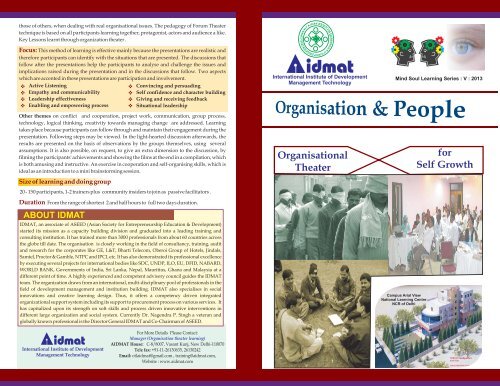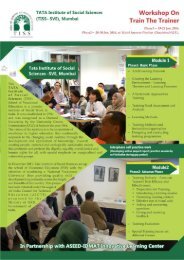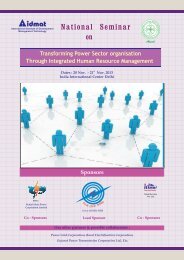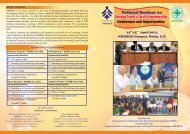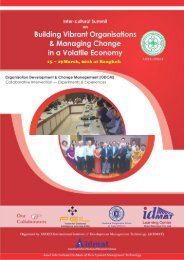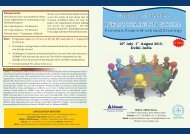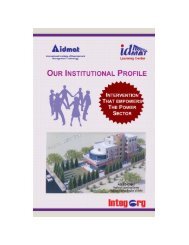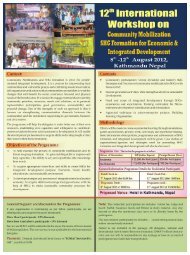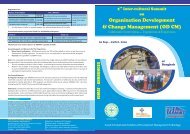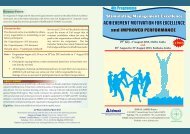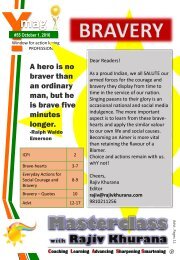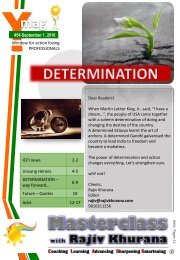theatre Intervention (Organisation & People)
Create successful ePaper yourself
Turn your PDF publications into a flip-book with our unique Google optimized e-Paper software.
those of others, when dealing with real organisational issues. The pedagogy of Forum Theater<br />
technique is based on all participants learning together, protagonist, actors and audience a like.<br />
Key Lessons learnt through organization theater .<br />
Focus:<br />
This method of learning is effective mainly because the presentations are realistic and<br />
therefore participants can identify with the situations that are presented. The discussions that<br />
follow after the presentations help the participants to analyse and challenge the issues and<br />
implications raised during the presentation and in the discussions that follow. Two aspects<br />
which are accented in these presentations are participation and involvement.<br />
Active Listening<br />
Empathy and communicability<br />
Leadership effectiveness<br />
Enabling and empowering process<br />
Other themes on conflict and cooperation, project work, communication, group process,<br />
technology, logical thinking, creativity towards managing change are addressed. Learning<br />
takes place because participants can follow through and maintain their engagement during the<br />
presentation. Following steps may be viewed. In the light-hearted discussion afterwards, the<br />
results are presented on the basis of observations by the groups themselves, using several<br />
assumptions. It is also possible, on request, to give an extra dimension to the discussion, by<br />
filming the participants' achievements and showing the films at the end in a compilation, which<br />
is both amusing and instructive. An exercise in cooperation and self-organising skills, which is<br />
ideal as an introduction to a mini brainstorming session.<br />
Size of learning and doing group<br />
20 - 150 participants, 1-2 trainers plus community insiders to join as passive facilitators .<br />
Duration<br />
From the range of shortest 2 and half hours to full two days duration.<br />
ABOUT IDMAT<br />
Convincing and persuading<br />
Self confidence and character building<br />
Giving and receiving feedback<br />
Situational leadership<br />
IDMAT, an associate of ASEED (Asian Society for Entrepreneurship Education & Development)<br />
started its mission as a capacity building division and graduated into a leading training and<br />
consulting institution. It has trained more than 3000 professionals from about 60 countries across<br />
the globe till date. The organisation is closely working in the field of consultancy, training, audit<br />
and research for the corporates like GE, L&T, Bharti Telecom, Oberoi Group of Hotels, Jindals,<br />
Samtel, Proctor & Gamble, NTPC and IPCL etc. It has also demonstrated its professional excellence<br />
by executing several projects for international bodies like SDC, UNDP, ILO, EU, DFID, NABARD,<br />
WORLD BANK, Governments of India, Sri Lanka, Nepal, Mauritius, Ghana and Malaysia at a<br />
different point of time. A highly experienced and competent advisory council guides the IDMAT<br />
team. The organization draws from an international, multi-disciplinary pool of professionals in the<br />
field of development management and institution building. IDMAT also specialises in social<br />
innovations and creative learning design. Thus, it offers a competency driven integrated<br />
organizational support system including its support to procurement process on various services. It<br />
has capitalized upon its strength on soft skills and process driven innovative interventions in<br />
different large organization and social system. Currently Dr. Nagendra P. Singh a veteran and<br />
globally known professional is the Director General IDMAT and Co-Chairman of ASEED.<br />
ASIAN SOCIETY FOR ENTREPRENEURSHIP EDUCATION DEVELOPMENT<br />
International Institute of Development<br />
Management Technology<br />
<strong>Organisation</strong>al<br />
Theater<br />
Mind Soul Learning Series :V:2013<br />
C<strong>amp</strong>us Arial View<br />
National Learning Centre<br />
NCR of Delhi<br />
for<br />
Self Growth<br />
International Institute of Development<br />
Management Technology<br />
For More Details Please Contact:<br />
Manager (<strong>Organisation</strong> theater learning)<br />
AIDMAT House: C-8/8007, Vasant Kunj, New Delhi-110070<br />
Tele fax: +91-11-26130635, 26130242<br />
Email: otlaidmat@gmail.com , training@aidmat.com,<br />
Website : www.aidmat.com
AIDMAT Indigenous Learning Center<br />
<strong>Organisation</strong>al <strong>theatre</strong> <strong>Intervention</strong>: Towards<br />
Corporate and Social Change<br />
History has proved that indigenous<br />
theatrical mode of learning has been one of<br />
most ancient method to impact social<br />
change globally .Either we trace<br />
Shakespear or kalidas's contribution of the<br />
past or revisit andragogy of modern times<br />
that has set innovative method to set an<br />
educational revolution Social sector<br />
organizations have been using such a<br />
method as a powerful tool over the years<br />
through 'street plays' through community<br />
Interactive mode of drama or<br />
role plays are the enactment of<br />
real and imagined events<br />
through roles and situations. It<br />
has been used over the ages to<br />
portray human behaviour and<br />
activities and to expose social<br />
and political issues with<br />
outstanding effectiveness.<br />
participation and their enactment mode conveying stories of change what society<br />
needs to address.<br />
Theater has embodied several creative methods with real life experiences on the<br />
stage where we work together ,live and interact. Corporate sector have also begun<br />
exploring such training learning methods in their educational programmes on<br />
selective mode .<br />
Theatrical intervention<br />
It signifies how real-life actors (humans as well as organisations) live and adapt<br />
themselves to changing environments and how they change their environment by<br />
their actions. Plays, written and evolved by people themselves for specific<br />
organisational problems, are staged in front of organisational audiences with the<br />
aim of changing employees' work behaviours”.Theorists and practitioners of<br />
<strong>theatre</strong> have always seen their art as a way of investigating social life. Some were<br />
descriptive (like the Realists); some had an idea of bringing change to society.<br />
AIDMAT indigenous learning center defines the techniques of theater to<br />
investigate organisational life. Theater tools are used in connection with the<br />
organisational world. Similarly musical and performing arts eg. dance ,drama,<br />
painting and many other blended cultural tools have always been a great<br />
motivator to bring social change<br />
Drama and Role Plays<br />
Interactive theater has been experimented with in the social context where 'spectactors'<br />
are invited to suggest and enact solutions to forms of oppression and social<br />
problems. It is possible to bring social innovations and creativity by engaging the<br />
employees and community through direct and indirect participation. As viewers<br />
and actors they get hooked to address the common institutional issues for directed<br />
goal. Role play techniques are used as simulated learning design that is quite<br />
different from dram where script is offered . But combination of drmam with role<br />
play technique are being used effectively for educational purposes. Aidmat with<br />
strong social roots explores and collaborates on such technique with corporate<br />
world. It has begun experimenting new a design for several social projects at<br />
grassroots level in partnership several<br />
known theatrical groups and also at its<br />
own in corporate world.<br />
<strong>Organisation</strong>al Theater<br />
OM means first of all tailor-made plays<br />
staged for a specific organisation or a<br />
subgroup in an organisation.<br />
<strong>Organisation</strong>al theater consists of the<br />
following elements. Generally, professional<br />
performers would take up from out sideor<br />
employees themselves stage a play.<br />
The concept of using drama in<br />
training is for subjects to learn<br />
in an effective way about a<br />
subject matter, which is<br />
presented in a realistic manner<br />
that would engage and involves<br />
the subjects throughout he<br />
action. Therefore, subjects are<br />
not passive recipients of<br />
information, nor are they just an<br />
audience, but active participants.<br />
Employees or learning group themselves prepare or evolve the script rehearse and<br />
act in small groups through mime or dialogue to present before community to get<br />
their feedback .Facilitator acts passively to support the team and joins as moderator<br />
at the end. He may act as an anchor.<br />
Case Methods<br />
Are converted in to community role plays where every one is hooked to draw<br />
lessons as viewer and act as well. The play is directed towards a clearly defined<br />
audience, e.g. the service department, the sales people, the branch managers,<br />
production unit and research unit or allied functional team as per case learning goal<br />
and requirement. (Each case has potential to be converted in to a powerful drama<br />
with strong message.)<br />
Theater Presentation<br />
Aims at getting the audience deeply involved and confronting it with hidden<br />
conflicts, subconscious behavioural patterns or with painful truths. The audience is<br />
exposed to well known situations on stage. Typical problem situations dramatized<br />
in organisational theater plays include sexual harassment, gender issues, conflict<br />
management, communication barriers between middle and lower management,<br />
and discrimination. Learners group forum Theater is developed as a process that<br />
allows the audience to become directors and scriptwriters with an experienced<br />
facilitator/<strong>theatre</strong> director. It is an exciting and innovative way of exploring<br />
sensitive issues and opening up discussion for people to discuss freely to focus on<br />
multi thematic areas on behavioural skills and their related<br />
value on main cluster areas.<br />
Conceptual Thrust<br />
Mindset<br />
Character<br />
Competencies<br />
In the <strong>Organisation</strong>al theater forum created in the learning<br />
group attempts are made to focus and redefine problem or issue<br />
that is encapsulated in a written script which allows the participants to explore the<br />
characters, personalities and issues . It is then 'acted' out by the group to an audience<br />
(other colleagues) who attempt to make interventions to alter the course of the<br />
dramatic action by proposing solutions using the Forum Theater technique.<br />
Predictions are made in the written script as to when and what these interventions<br />
could be. Case method conversion in to roleplay and dramatic intervention drive the<br />
entire viewers in to actors and learning and acting community This provides subjects<br />
with the opportunity to learn about their behaviour and attitudes in action, as well as


